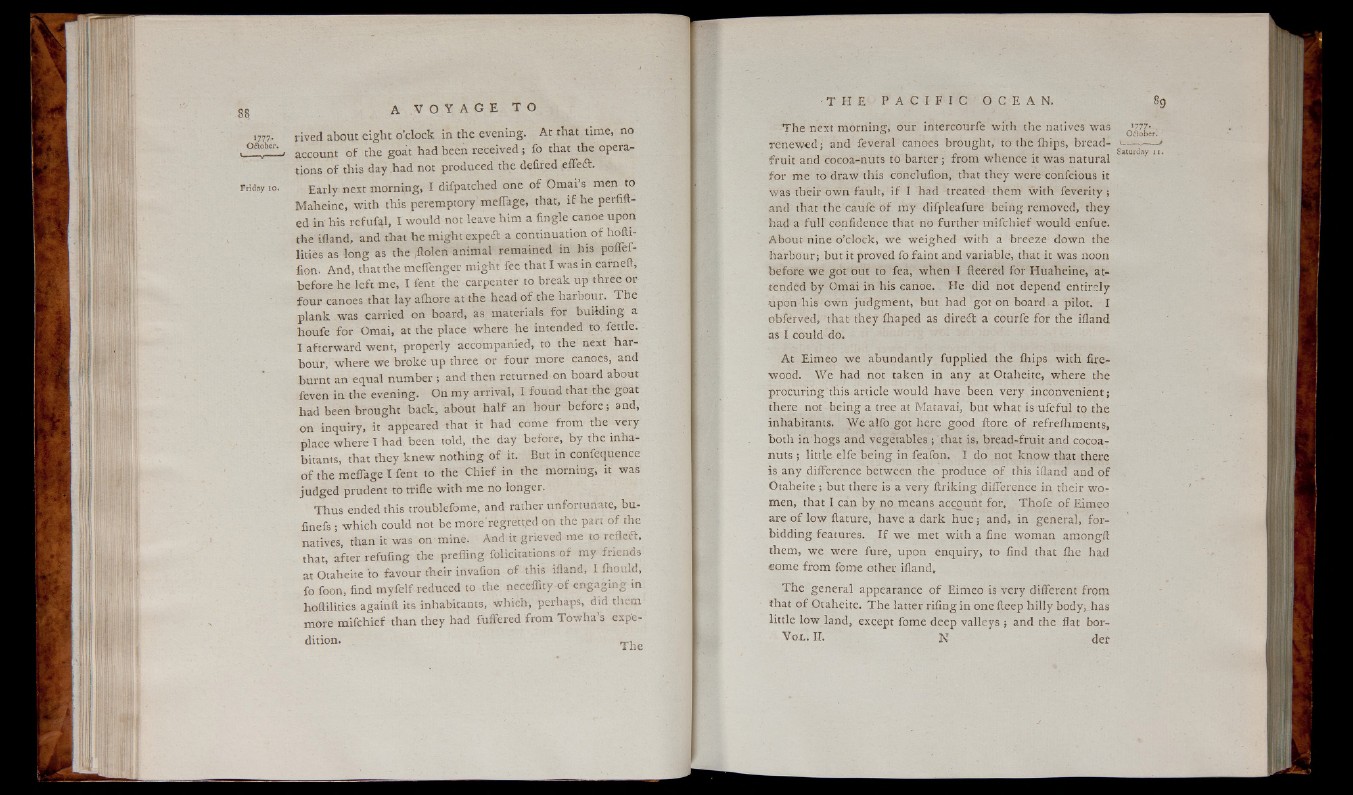
rived about e ight o’clock in the evening. At that time, no
account o f the goat had been re c e iv e d ; fo that the operations
o f this day had not produced the defired e ffed.
Early next morning, I difpatched one o f Omai’s men to
Maheine, with this peremptory meffage, that, i f he perfift-
ed in his re fufal, I would not leave him a fingle canoe upon
the ifland, and that he might expeft a continuation o f hofti-
lities as long as the .fiolen animal remained in his poffef-
fion. And, that the meffenger might fee that I was in earneft,
before he left me, I fent the carpenter to break up three or
fo u r canoes that la y aihore at the head o f the harbour. T h e
plan k was carried on board, as materials fo r buildin g a
houfe fo r Omai, at the place where he intended to, fettle.
I afterward went, properly accompanied, to the next harbour,
where we broke up three or four more canoes, and
burnt an equal n um b e r ; and then returned on board about
feven in the evening. On my arrival, I found that the goat
had been brought back, about h a lf an hour b e fo re ; and,
on inquiry, it appeared that it had come from the ve ry
place where I had been told, the day before, by the inhabitants,
that they k n ew nothing o f it. But in confequence
o f the meffage I fent to the C h ie f in the morning, it was
ju d g ed prudent to trifle w ith me no longer.
Thus ended this troublefome, and rather unfortunate, bur
finefs ; w hich could not be more'regretted on the part o f the
natives, than it was on mine. And it grieved me to reflect,
that, after refufing the preffing folicitations o f m y friends
at Otaheite to favour their invafion o f this ifland, I ihould,
fo foon, find myfelf reduced to the neceflity o f en g ag in g in
hoftilities againft its inhabitants, which, perhaps, did them
more mifchie f than they had fuffered from T owh a s expedition.
T h e
T he next morning, our intercourfe with the natives was ’¿$8 •
0 O c to b e r .
ren ew ed ; and feveral canoes brought, to the ihips, bread- 1----- •
_ , . Sa tu rd a y i x .
f ru it and cocoa-nuts to b a rte r; from whence it was natural
fo r me to draw this conclufion, that they were confcious it
was their own fau lt, i f I had treated them with feverity ;
and that the caufe o f m y difpleafure being removed, they
had a fu ll confidence that no furth er m ifch ie f would enfue.
About nine o’clock, we w eigh ed with a breeze down the
harbour; but it proved fo faint and variable, that it was noon
before w e got out to fea, when I fleered for Huaheine, attended
b y Omai in his canoe. He did not depend entirely
upon his own judgment, but had got on board, a pilot. I
obferved, that they ihaped as diredt a courfe for the ifland
as I could do.
A t Eimeo we abundantly fupplied the ihips w ith firewood.
We had not taken in any at Otaheite, where the
procuring this article would have been ve ry inconvenient;
there not being a tree at Matavai, but what is u fe fu l to the
inhabitants. We alfo got here good ftore o f refrelhments,
both in hogs and vegetables ; that is, bread-fruit and cocoa-
nuts ; little elfe be in g in feafon. I do not kn ow that there
is any difference between the produce o f this ifland and o f
Otaheite ; but there is a very ftriking difference in their w o men,
that I can by no means account for. Thofe o f Eimeo
are o f low ftature, have a dark hue ; and, in general, fo rbidding
features. I f w e met with a fine woman amongft
them, we were fure, upon enquiry, to find that fhe had
come from fome other ifland.
T h e general appearance o f Eimeo is ve ry different from
that o f Otaheite. T h e latter riling in one fteep h illy body,.has
little low land, except fome deep valleys ; and the flat bor-
V o x . II. N der